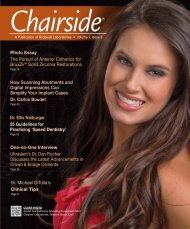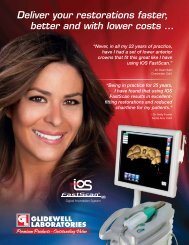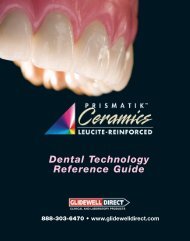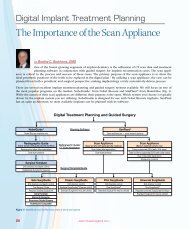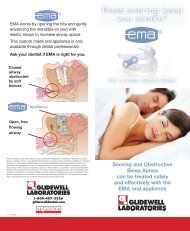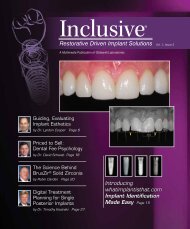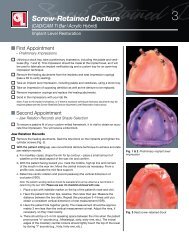PDF Version - Glidewell Dental Labs
PDF Version - Glidewell Dental Labs
PDF Version - Glidewell Dental Labs
You also want an ePaper? Increase the reach of your titles
YUMPU automatically turns print PDFs into web optimized ePapers that Google loves.
about what these folks could accomplish if they put their<br />
minds to honest labor.<br />
MD: I guess what they’re doing on a small scale is what happens<br />
in big Wall Street firms when there is embezzlement. I don’t<br />
know if you have come across any studies or surveys on this, but<br />
what percent of dentists would you say will have embezzlement<br />
be an issue in their office at some point in their career?<br />
DH: In the published statistics, there are two or three<br />
surveys saying that somewhere between 50 and 60 percent<br />
of dentists will be victims. But there is a confounding factor<br />
to this because there is a fair amount of embezzlement that<br />
never gets detected by anybody and therefore won’t be in<br />
the statistics. So the true number is probably higher, but I<br />
think it’s safe to tell your audience that at least three in five<br />
dentists will be victims at some point in their careers.<br />
MD: Wow, that seems like a pretty high number. I wonder<br />
how much of that is from repeat offenders like the person you<br />
referenced in your first story where she goes from one office to<br />
another. Is that a common occurrence?<br />
DH: It definitely happens. We call them serial embezzlers.<br />
There was one woman who was working in the Toronto,<br />
Canada, area. Over a period of four years, she worked in<br />
13 different practices and stole from all of them. She was<br />
really good at getting hired, but as a thief — despite a fair<br />
amount of practice — she wasn’t all that skilled. So she<br />
would get caught fairly quickly and get terminated, then<br />
move to the next office.<br />
MD: If these so-called serial embezzlers can come up with<br />
creative schemes that continue to impress you, I would guess<br />
that they have decent verbal skills when it comes to lying.<br />
So couldn’t they show up at an office and seem to be a<br />
dream employee?<br />
DH: Absolutely. The serial embezzlers are very much takecharge<br />
people. They cater to what I sometimes call the<br />
“wet-fingered fantasy” some dentists have. A fantasy where<br />
they get into their office every morning, do high-quality<br />
dentistry on a relatively small number of patients and then<br />
go home, without having to get dragged into the messiness<br />
of managing their practice. The serial embezzlers cater to<br />
that. They know the computer systems really well; they’re<br />
organized and efficient. They look like they are working<br />
hard. It’s what every dentist wants. So it’s easy for them to<br />
get hired because when they’re in the door, they cater to<br />
this idea. They’re the people who will run personal errands<br />
for you on their lunch hours.<br />
MD: To back up the impression that they are somebody who<br />
would take a bullet for you, so how could they ever embezzle?<br />
DH: That’s right. Now, having said all that, the vast majority<br />
of embezzlement is not carried on by the serial embezzlers.<br />
It’s done by long-time employees. The big stuff that we<br />
investigate is usually from employees who have been in<br />
your office for 3, 5 or 12 years. Generally speaking, we think<br />
that these people had no plan to embezzle from you when<br />
they were hired. But then something happened to them<br />
that put their backs to the wall financially, and they decided<br />
that instead of going downtown and stealing people’s<br />
wallets, just sitting at the same desk where they work every<br />
day and handling the paperwork a little differently was a<br />
better answer.<br />
MD: Wow, so it’s often somebody who started off as a trusted<br />
employee and probably has a well-deserved good reputation?<br />
DH: Clean employment record, no blemishes on it at all.<br />
One morning they just woke up and said, “Today is the day<br />
I’m going to steal from my employer.”<br />
MD: Yeah, or something happens. Maybe they lose their house,<br />
a spouse loses a job, or they get divorced. There might be a<br />
situation that makes them desperate enough to steal from a<br />
person they might have previously held a lot of affection and<br />
trust for.<br />
DH: What I’ll suggest is that there are different definitions<br />
of desperation. There are some real hardship cases like<br />
the examples you mentioned; you know, somebody who<br />
is three months behind on their mortgage payment and is<br />
about to lose their house. We also find people who steal<br />
to get things that you and I probably wouldn’t consider<br />
necessities. We’re wrapping up an investigation now where<br />
the woman who was stealing was spending $800 a month<br />
on a personal trainer, and she also belonged to something<br />
called the Shoe of the Month Club. I wouldn’t consider her<br />
to be desperate. But of course what I think doesn’t matter;<br />
it’s her perception that governs her behavior.<br />
MD: Exactly. Do you think dentists are more prone to this type<br />
of embezzlement than other small businesses?<br />
DH: Probably. There is one differentiating characteristic<br />
between the way dentistry operates compared to, say, a<br />
plumbing business. The differentiation has nothing to do<br />
with the amount of business knowledge that each owner<br />
has, or the amount of attention that each spends on<br />
business versus the other things in their trade. What sets<br />
dentistry apart is that a lot of it is paid for by third parties.<br />
So we have this unstable situation where patients, for the<br />
most part, really don’t understand a whole lot about what<br />
just happened in their mouth, and somebody else is paying<br />
for it anyway. So the amount of attention that patients pay<br />
when leaving your office is minimal. If there is an extra<br />
charge in there or something that shouldn’t be, very few<br />
patients are going to notice it and object.<br />
MD: Especially if it’s an extra charge that is billed to the<br />
insurance company, right?<br />
Interview with David Harris47



